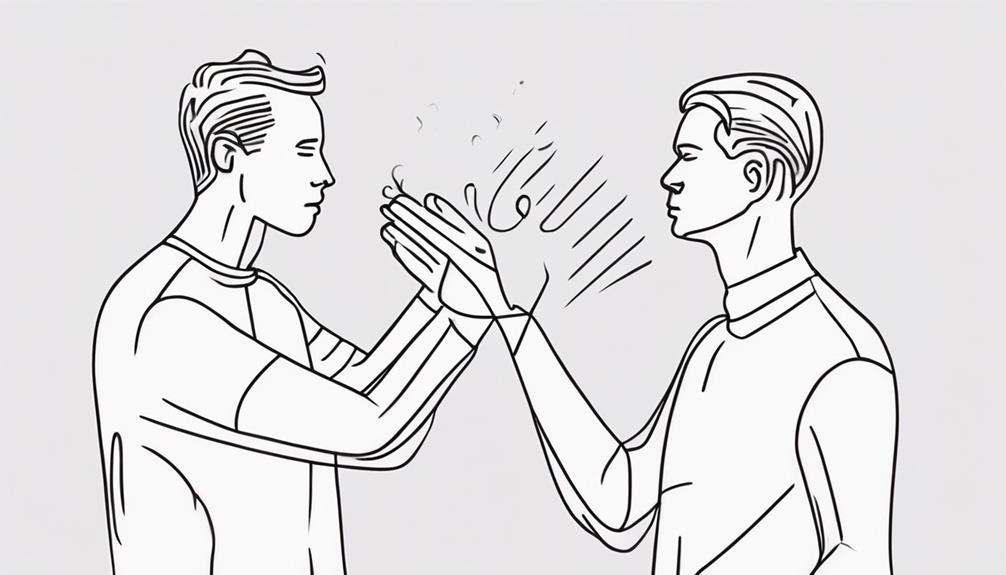Argumentation is a fundamental aspect of human interaction, often arising from differing viewpoints, values, or needs. Understanding the root causes of disputes is essential in navigating towards resolution. However, the path to reconciliation requires more than mere acknowledgment; it demands a strategic approach that incorporates effective communication, emotional intelligence, and external support when necessary. By exploring the complexities of why conflicts occur and delving into proven methodologies for conflict resolution, we can unravel the intricacies of human behavior and foster harmonious relationships.
Key Takeaways
- Clear communication and empathy are essential for resolving conflicts.
- Understanding differing beliefs and needs helps in finding common ground.
- Utilize emotional regulation techniques to stay calm during disagreements.
- Seek mediation or professional help for structured conflict resolution processes.
Common Causes of Arguments

Misunderstandings, differing beliefs, conflicting needs, and perceived mistreatment are widely recognized as primary triggers for arguments among individuals. When individuals hold contrasting viewpoints or have unmet needs that conflict with those of others, tensions can arise, leading to disputes. Misunderstandings often stem from miscommunication or misinterpretation of information, while differing beliefs can create a clash of ideologies. Conflicting needs occur when individuals' requirements or desires are incompatible, fueling discord. Perceived mistreatment, whether real or imagined, can also provoke arguments by evoking feelings of injustice or inequality.
To navigate these triggers effectively, it is crucial to employ strategies for conflict resolution. By addressing misunderstandings through clear communication, acknowledging and respecting differing beliefs, finding compromises for conflicting needs, and addressing perceived mistreatment with empathy and understanding, individuals can work towards resolving disputes amicably. Effective conflict resolution involves active listening, open dialogue, and a willingness to seek common ground. By embracing these principles, individuals can foster understanding, respect, and harmony in their interactions, ultimately leading to more peaceful and constructive relationships.
Communication Strategies for Conflict Resolution
When addressing conflicts, the application of effective communication strategies is paramount for achieving successful resolution and fostering positive relationships. In conflict resolution, individuals often grapple with power and control dynamics, leading to heated arguments. To navigate these challenges, it is crucial to acknowledge and respect different perspectives. Using communication tools such as concise language, accurate emotion labeling, and specific language can help de-escalate tensions and pave the way for constructive dialogue. Strategies derived from programs like the CRAFT program by Robert J. Myers and principles from the Al-Anon 12-Step program can be instrumental in managing conflicts in various settings, including workplaces and families. Changing communication patterns involves understanding the root causes of disagreements and transitioning towards more positive interactions. Encouraging healthy communication by expressing expectations positively, demonstrating empathy and understanding, and sometimes agreeing to disagree can help resolve conflicts and prevent arguments from escalating.
Emotional Regulation Techniques

Utilizing effective emotional regulation techniques is essential in managing and controlling intense emotions, such as anger, during interpersonal conflicts. Here are four key strategies to help individuals navigate their emotions and maintain composure during heated arguments:
- Stay Calm: One of the fundamental steps in emotional regulation is to stay calm when faced with conflict. Remaining composed can help prevent escalation and promote clearer thinking.
- Deep Breathing: Engaging in deep breathing exercises can help regulate emotions by calming the physiological responses to stress. Taking slow, deep breaths can signal the body to relax and reduce feelings of anger or frustration.
- Mindfulness Exercises: Practicing mindfulness involves focusing on the present moment without judgment. Mindfulness exercises can help individuals become more aware of their emotions and thought patterns, allowing them to respond to conflicts more intentionally.
- Walking Away: Sometimes, the best course of action is to take a break from the situation. Walking away temporarily can provide space to cool down, gather thoughts, and approach the conflict with a clearer perspective.
Seeking Mediation and Professional Help
In the context of interpersonal conflicts, seeking mediation and professional assistance can offer structured guidance and support in navigating complex arguments and fostering effective resolution strategies. Mediation involves a neutral third party facilitating communication between conflicting parties to find a mutually acceptable resolution. This process can help clarify misunderstandings, manage emotions, and create a collaborative environment for conflict resolution. Professional help from counselors, therapists, or conflict resolution specialists is also crucial in providing guidance and support in resolving intricate arguments. These trained professionals can assist individuals in addressing underlying issues, improving communication skills, and finding common ground. When arguments escalate or emotions become overwhelming, seeking mediation or professional help can provide a structured approach to resolving conflicts. Ultimately, involving someone else to help you resolve disputes can lead to more successful conflict resolution outcomes, especially when parties struggle to find solutions independently.
Implementing Long-Term Solutions

Long-term solutions for resolving arguments necessitate a comprehensive examination of underlying issues and communication patterns. When seeking to implement sustainable conflict resolution strategies, consider the following:
- Active Listening: Engage in active listening to understand someone else's perspective fully. This approach can help uncover hidden concerns and foster empathy, leading to mutual understanding.
- Empathy Building: Cultivate empathy to recognize and validate the needs of another person. Acknowledging differing perspectives is crucial when needs may conflict during an argument.
- Professional Guidance: Seeking help from a counselor or mediator can provide valuable insights and tools to navigate complex relational dynamics. Professional intervention offers guidance on effective communication and conflict resolution techniques.
- Tailored Strategies: Develop personalized conflict resolution strategies that address the specific dynamics of your relationships. Tailoring approaches to individual needs and communication styles enhances the likelihood of long-lasting resolution.
Frequently Asked Questions
How Can Arguments Be Resolved?
In conflict resolution, embracing active listening, compromise, and effective communication skills is paramount. Employing conflict resolution strategies, like mediation and de-escalation techniques, can facilitate understanding and empathy between parties. Patience and collaboration play crucial roles in reaching mutually beneficial resolutions. By approaching disagreements with a willingness to understand each other's perspectives and work towards common ground, arguments can be resolved in a constructive manner, fostering healthier relationships.
Why Do People Argue?
Communication breakdowns, misunderstandings escalating, ego clashes, clashes of different perspectives, and flaring emotions are common reasons why people argue. These factors contribute to conflicts and disputes that can hinder effective communication and relationship dynamics. Understanding these root causes is essential for addressing underlying issues and fostering mutual understanding. By recognizing these triggers, individuals can work towards resolving conflicts and improving their relationships through effective communication and conflict resolution strategies.
How Do You Deal With People Who Argue?
When dealing with individuals who engage in arguments, it is crucial to practice active listening, set clear boundaries, regulate emotions effectively, seek to understand their perspective, and aim for conflict resolution. By actively listening, one can demonstrate respect and empathy towards the other party. Setting boundaries helps maintain a healthy dialogue. Emotional regulation prevents escalation. Seeking understanding fosters mutual respect. Ultimately, conflict resolution techniques can lead to constructive and peaceful outcomes.
How Do You Resolve Your Fights?
In resolving fights, employing active listening, understanding, and effective communication are crucial. By practicing empathy and respect, individuals can find common ground and collaborate on solutions that promote compromise. Taking breaks to cool down and apologizing when necessary can also help in moving forward positively. Ultimately, conflict resolution requires a willingness to understand each other's perspectives and work together towards mutually beneficial outcomes.
Conclusion
In conclusion, resolving arguments requires effective communication, emotional regulation, and seeking professional help when needed. By understanding the common causes of arguments and implementing strategies for conflict resolution, individuals can improve their relationships and achieve positive outcomes. One interesting statistic to consider is that 65% of workplace conflicts stem from communication issues, highlighting the importance of addressing misunderstandings and fostering open dialogue to prevent arguments.
